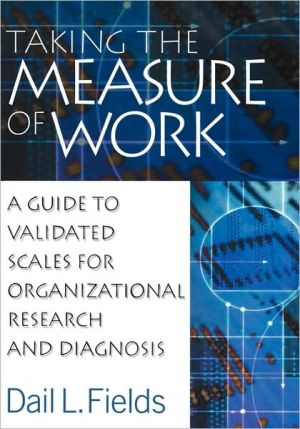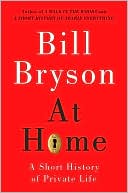Taking The Measure Of Work
Organizational researchers and managers have never had a single easy-to-use resource for validated measures, often relying on a selection of journal articles or improvised solutions to meet immediate needs. Taking the Measure of Work: A Guide to Validated Scales for Organizational Research and Diagnosis provides researchers, consultants, managers, and organizational development specialists validated and reliable ways to measure how employees view their work and their organization.
Search in google:
"It is well, well done -- I will indeed recommend it . . . this type of work has been long needed in our field." --Robert J. Vandenberg, University of Georgia Organizational researchers and managers have never had a single easy-to-use resource for validated measures, often relying on a selection of journal articles or improvised solutions to meet immediate needs. Taking the Measure of Work: A Guide to Validated Scales for Organizational Research and Diagnosis provides researchers, consultants, managers, and organizational development specialists validated and reliable ways to measure how employees view their work and their organization.Whether preparing questionnaires or interviews for an employee survey, organizational assessment, dissertation or research program, this book guides users to a summary level understanding of each topic area, the measurement issues in the area, and a selection of measures to choose from. The measures cover the areas of: Job Satisfaction Organizational Commitment Job Characteristics Job Stress Job Roles Organizational Justice Work-Family Conflict Person-Organization Fit Work Behaviors Work Values About the AuthorDail L. Fields (Ph.D., Georgia Tech, 1994) is Associate Professor at the Regent University School of Business. His research interests include measurement of employee perspectives on work, cross-cultural management, human resource management strategies, and leadership and values in organizations. He is a member of the Academy of Management and the Academy ofInternational Business. Prior to beginning an academic career in 1994, he was a management executive with MCI Communications Corp. and a management consultant with Touche Ross & Co.
PrefaceAcknowledgmentsIntroduction1Job Satisfaction1Overall Job Satisfaction (Cammann, Fichman, Jenkins, and Klesh 1983)5Job Satisfaction Relative to Expectations (Bacharach, Bamberger, and Conley 1991)6Minnesota Satisfaction Questionnaire (Weiss, Dawis, England, and Lofquist 1967)7Job in General Scale (Ironson, Smith, Brannick, Gibson, and Paul 1989)9Overall Job Satisfaction (Taylor and Bowers 1974)10Overall Job Satisfaction (Judge, Boudreau, and Bretz 1994)11Global Job Satisfaction (Quinn and Shepard 1974)12Job Satisfaction Survey (Spector 1985)14Job Satisfaction Index (Schriesheim and Tsui 1980)16Job Perception Scale (Hatfield, Robinson, and Huseman 1985)17Overall Job Satisfaction (Brayfield and Rothe 1951)18Job Diagnostic Survey (Hackman and Oldham 1974)20Job Descriptive Index (Smith, Kendall, and Hulin 1969)23Satisfaction With Job Facets (Andrews and Withey 1976)26Global Job Satisfaction (Warr, Cook, and Wall 1979)27Career Satisfaction (Greenhaus, Parasuraman, and Wormley 1990)29Employee Satisfaction With Influence and Ownership (Rosen, Klein, and Young 1986)30Satisfaction with Work Schedule Flexibility (Rothausen 1994)32Pay Satisfaction Questionnaire (Heneman and Schwab 1985)33Index of Organizational Reactions (Dunham and Smith 1979)35Satisfaction With My Supervisor (Scarpello and Vandenberg 1987)412Organizational Commitment43Organizational Commitment Questionnaire (Mowday, Steers, and Porter 1979)46Shortened Organizational Commitment Questionnaire (Mowday, Steers, and Porter 1979 and 1982)49Affective, Normative, and Continuance Commitment (Allen and Meyer 1990)51Psychological Attachment Instrument (O'Reilly and Chatman 1986)54Organizational Commitment (Cook and Wall 1980)56Organizational Commitment (General Social Survey 1991)58Organizational Commitment Scale (Balfour and Wechsler 1996)59Organizational Commitment (Jaros, Jermier, Koehler, and Sincich 1993)61Career Commitment (Blau 1989)63Commitment to a Parent Company Versus Local Operation (Gregersen and Black 1992)64Supervisor-Related Commitment (Becker, Billings, Eveleth, and Gilbert 1996)653Job Characteristics67Job Diagnostic Survey, With Revisions (Hackman and Oldham 1974, with revisions from Idaszak and Drasgow 1987)70Job Characteristics Inventory (Sims, Szilagyi, and Keller 1976)76Multimethod Job Design Questionnaire (Campion 1988)78Job Demands and Decision Latitude (Karasek 1979)82Job Characteristics Based on the Dictionary of Occupational Titles (Roos and Treiman 1980)84Job Complexity Based on the Dictionary of Occupational Titles (Hunter 1980)86Job Cognitions (Williams and Anderson 1991)88Job Overload (Caplan, Cobb, French, Van Harrison, and Pinneau 1980)90Job Routinization and Formalization (Bacharach, Bamberger, and Conley 1990)91Subjective Monotony (Melamed, Ben-Avi, Luz, and Green 1995)93Work Control (Dwyer and Ganster 1991)94Job Control, Cognitive Demand, and Production Responsibility (Jackson, Wall, Martin, and Davids 1993)96Control and Complexity (Frese, Kring, Soose, and Zempel 1996)98Job Uncertainty, Complexity, Variety, and Interdependence (Dean and Snell 1991)100Job Interdependence (Pearce and Gregersen 1991)103Extent of Computer Use (Medcof 1996)104Supportive and Non-Controlling Supervision (Oldham and Cummings 1996)106Supervisory Support (Greenhaus, Parasuraman, and Wormley 1990)108Developmental Experiences (Wayne, Shore, and Liden 1997)109Performance Appraisal System Knowledge (Williams and Levy 1992)110Work-Related Expectancies (Eisenberger, Fasolo, and Davis-LaMastro 1990)111Empowerment at Work Scale (Spreitzer 1995)113Social Support (Caplan, Cobb, French, Van Harrison, and Penneau 1975)115Perceived Organizational Support (POS) (Eisenberger, Huntington, Hutchinson, and Sowa 1986)117Perceptions of Organizational Politics Scale (Kacmar and Ferris 1991)1194Job Stress121Work Tension Scale (House and Rizzo 1972)123Job-Related Tension Index (Kahn, Wolfe, Quinn, and Snoek 1964)124Burnout Measure (Pines and Aronson 1988)126Work-Related Depression, Anxiety, and Irritation (Caplan, Cobb, French, Van Harrison, and Pinneau 1980)127Frustration With Work (Peters, O'Connor, and Rudolf 1980)128Stress Diagnostic Survey (Ivancevich and Matteson 1980)129Job Stress Scale (Parker and Decotiis 1983)132Inventory of Stressful Events (Motowidlo, Packard, and Manning 1986)133Occupational Stress Scale: (House, McMichael, Wells, Kaplan, and Landerman 1979)135Perceived Job Stressors (Kanner, Kafry, and Pines 1978)137Commute Strain Scale (Kluger 1998)139Work-Specific Control Problems (Remondet and Hansson 1991)141Industrial Relations Event Scale (Kelloway, Barling, and Shah 1993)1435Job Roles145Role Conflict and Ambiguity (Rizzo, House, and Lirtzman 1970)147Role Conflict and Ambiguity (House, Schuler, and Levanoni 1983)149Role Hassles Index (Zohar 1997)151Role Overload (Bacharach, Bamberger, and Conley 1990)153Cross-Cultural Role Conflict, Ambiguity, and Overload (Peterson et al. 1995)154Inter-Role Conflict (Thompson and Werner 1997)156Role Justice (Zohar 1995)157Job Role Ambiguity (Breaugh and Colihan 1994)158Goal and Process Clarity (Sawyer 1992)160Job Role Discretion (Gregersen and Black 1992)161Role Innovation (West 1987)1626Organizational Justice163Distributive and Procedural Justice (Sweeney and McFarlin 1997)165Distributive and Procedural Justice (Joy and Witt 1992)167Distributive and Procedural Justice (Parker, Baltes, and Christiansen 1997)168Distributive, Procedural, and Interactive Justice (Niehoff and Moorman 1993)170Distributive Justice Index (Price and Mueller 1986)172Procedural Justice (McFarlin and Sweeney 1992)174Procedural and Interactive Justice (Moorman 1991)175Procedural Justice (Folger and Konovsky 1989)177Procedural Fairness, Employee Voice, and Justification (Daly and Geyer 1994)179Perceived Injustice (Hodson, Creighton, Jamison, Rieble, and Welsh 1994)181Procedural and Interactive Justice (Farh, Earley, and Lin 1997)182Procedural Fairness (Scarpello and Jones 1996)184Fairness in Skill-Based Pay (Lee, Law, and Bobko 1998)186Procedural and Distributive Fairness of Gainsharing (Welbourne, Balkin, and Gomez-Mejia 1995)187Procedural Fairness Standards in Pay (Jones, Scarpello, and Bergmann 1999)189Procedural Justice in Performance Appraisal (Dulebohn and Ferris 1999)192Procedural Fairness in Restructuring and Layoffs (Mansour-Cole and Scott 1998)193Perceived Fairness in Goal Setting (Roberson, Moye, and Locke 1999)195Fairness Perceptions of an Organizational Policy (Grover 1991)1967Work-Family Conflict197Work Interference With Family and Family Interference With Work (Gutek, Searle, and Klepa 1991)199Work-Family Conflict (Kopelman, Greenhaus, and Connolly 1983)201Work-Family Conflict and Family-Work Conflict (Netemeyer, Boles, and McMurrian 1996)202Job-Family Role Strain Scale (Bohen and Viveros-Long 1981)204Career-Family Attitudes (Sanders, Lengnick-Hall, Lengnick-Hall, and Steele-Clapp 1998)206Job and Non-Work Conflict (Small and Riley 1990)210Work-Home Conflict (Bacharach, Bamberger, and Conley 1991)212Work to Family Conflict Scale (Stephens and Sommer 1996)213Control Over Areas of Work and Family (Thomas and Ganster 1995)2158Person-Organization Fit217Organizational Culture Profile (O'Reilly, Chatman, and Caldwell 1991)220Goal Congruence (Vancouver and Schmitt 1991)224Person-Organization Fit Scale (Bretz and Judge 1994)225Perceived Person-Organization Fit (Cable and Judge 1996)227Perceived Person-Organization Fit (Lovelace and Rosen 1996)228Person-Environment Fit (Caplan, Cobb, French, Van Harrison, and Pinneau 1980)229Perceived Ability-Job Fit (Abdel-Halim 1981)2339Workplace Behaviors235Organizational Citizenship Behavior (Moorman and Blakely 1995)238Organizational Citizenship Behaviors (Williams and Anderson 1991)240Organizational Citizenship Behavior (Podsakoff, MacKenzie, Moorman, and Fetter 1990)242Organizational Citizenship Behavior (Smith, Organ, and Near 1983)245Chinese Organizational Citizenship Scale (Farh, Earley, and Lin 1997)247Measuring Ingratiatory Behaviors in Organizational Settings (Kumar and Beyerlein 1991)249Taking Charge (Morrison and Phelps 1999)252Helping and Voice Behaviors (Van Dyne and LePine 1998)253On-the-job Behaviors (Lehman and Simpson 1992)255Antisocial Behaviors (Robinson and O'Leary-Kelly 1998)257Victimization Behavior in the Workplace (Aquino, Grover, Bradfield, and Allen 1999)258Deviant Behaviors (Aquino, Lewis, and Bradfield 1999)259Influence Tactics (Schriesheim and Hinkin 1990)26110Workplace Values263Value Attainment (Rokeach 1973)266Work Values Inventory (Manhardt 1972)268Protestant Work Ethic (Mirels and Garrett 1971)270Chinese Values Survey (Chinese Culture Connection 1987)272Work Value Survey (Schwartz 1994)275Measure of Ethical Viewpoints (Brady and Wheeler 1996)278Individual Beliefs About Organizational Ethics (Froelich and Kottke 1991)282Perceived Importance of Workplace Values (Van Dyne, Graham, and Dienesch 1994)284References285Name Index309Subject Index315About the Author327
\ Robert J. Vandenberg"It is well, well done — I will indeed recommend it . . . this type of work has been long needed in our field."\ \








